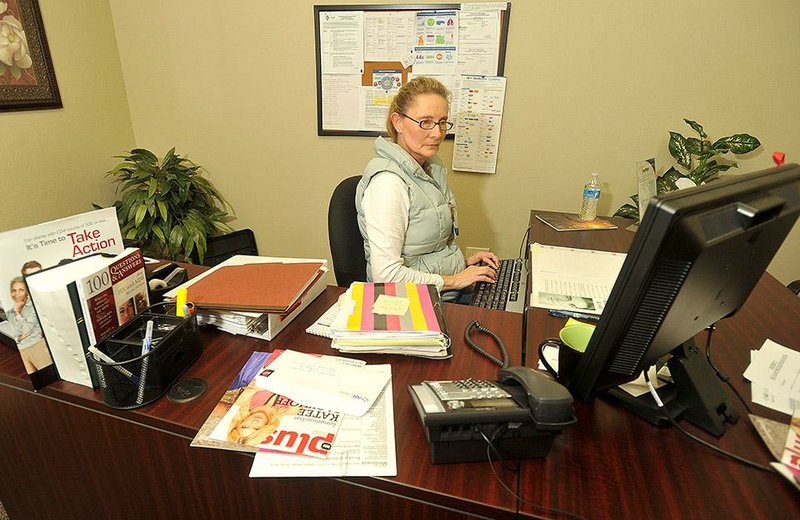The Centers for Disease Control and Prevention estimates about 1,198 people in Arkansas do not know they are positive for HIV. Another 5,458 Arkansans have been diagnosed with the virus.
Testing is crucial in slowing the spread of HIV in the United States and the state, said Ralph Wilmoth of the Arkansas Department of Health. Greater awareness from the public and health officials is needed to accomplish the goal, he said.
"We are not just thinking about the individual but the collective good," said Wilmoth, who heads the department's efforts against sexually transmitted infections. "If the person is infected and doesn't know they are, they are less likely to take precautions against transmitting the disease to others."
It can take up to 10 years for HIV symptoms to appear, Wilmoth said. Meanwhile, an infected person could be transmitting the virus.
HIV treatments can lower transmission of the virus, Wilmoth said. He said it is critical that people be tested.
It is recommended by the U.S. Preventive Services Task Force that everyone between the ages of 15 and 65 be screened for HIV at least once. People at higher risk should be screened more often. Anyone who engages in unsafe sex or injects drugs is at higher risk. Men who have sex with men also are at higher risk.
Raising awareness of HIV testing has been challenging, state health officials have said.
Wilmoth said testing recommendations often are not passed on from doctors to patients.
"From my personal experience I have never had a health care provider talk to me about this," Wilmoth said. "They don't want to talk about sex. That is a problem when we are talking about a test that primarily focuses on a sexually transmitted infection."
There are efforts nationally and within the state to inform physicians about the testing recommendation and to encourage them to talk to their patients about HIV tests, Wilmoth said.
Danny Harris, ARcare statewide outreach coordinator, travels the state speaking to community groups about the importance of HIV testing. ARcare is a nonprofit organization that operates 33 community health clinics in the state.
It can be difficult to find ways to get the message out, Harris said, pointing out that the message has to be spread to the entire population.
Harris said he speaks at college campuses, church groups and homeless shelters.
Perception about HIV is something that has to be changed, Harris said.
"People associate getting an HIV test with identity," Harris said. "They think it identifies them as being gay or sexually promiscuous. Those negative thoughts about being tested makes it hard sometimes to convince people to get tested."
Wilmoth said there are several ways that people can get an HIV test. He said every local health unit in the state can provide the test, as can most physicians.
Pharmacies also sell at-home HIV tests, Wilmoth said. However, he said, most physicians advise against using the at-home tests.
"We do not believe someone seeing that test result by themselves is a good idea," Wilmoth said. "We see people react to that knowledge. It is not a very good emotional response."
Harris learned he was HIV positive in 2006.
"I was infected through an act of violence, and for two years, it shook me to the core," Harris said. "It pretty much cost me everything because I couldn't handle it. I was one of those that thought I was tough, I was a man, and it shouldn't have happened."
There was a numb feeling after learning about the positive test result, Harris said. He then began to retreat from society.
"I felt like I was this toxic individual," Harris said. "I can't touch anyone. I can't love on my kids. I can't play with my grandkids."
People diagnosed with HIV need education about the virus, Harris said. He said they also need information about resources in the state for treatment.
Harris also raises awareness about HIV resources during his talks.
"I think it is important for people to think that HIV is not about dying anymore," Harris said. "The only people who die anymore are the people who don't take their medication. It is not a fearful thing like it used to be. It is living and loving like normal. If we can find those who are positive and get them on medication, they live a normal life."
Wilmoth said the earlier the diagnosis is made, the better it is for treatment. Going too long without treatment can weaken immune systems and allow other illnesses such as cancer to develop, he said.
The Health Department manages a Ryan White HIV Program grant, which funds primary medical care for HIV patients. The department awarded the funds to ARcare and Jefferson Comprehensive Care.
Households at 400 percent of the poverty level can receive care funded by the grant, Harris said. A person earning up to $46,680 can receive care and treatment, Harris said.
About 1,700 people in the state are using funds through the grants awarded to ARcare and Jefferson Comprehensive Care, Harris said.
Arkansas health officials hope to raise awareness during Monday's World AIDS Day about HIV and the need for testing.
NW News on 11/30/2014

